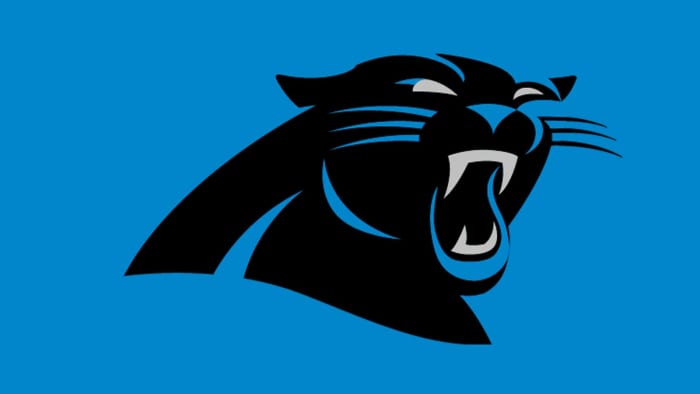When called upon, Anthony Johnson has always answered.
That was true in 1996 when he was needed to step up as the starting running back for the Carolina Panthers, and it's true today whenever he's needed as team chaplain for the Jacksonville Jaguars. We caught up with Johnson recently to see what he's doing now, and also to reminisce about his time with the Panthers – which included a 1,120-yard rushing season in 1996 after he replaced the injured Tshimanga Biakabutuka as the team's featured back.
How did it come to pass that you became team chaplain of an NFL team?
"Most of that really came from the influence and relationship that I had with a couple of chaplains during my playing time – one in particular was (former Panthers team chaplain) Mike Bunkley at Carolina. He and his wife were instrumental to my wife Shelley and I while I played at Carolina. Just coming alongside of us and encouraging, and spiritually challenging us and applying that to our game and our life in the NFL.
"So when I got done that last year in 2000 (and retired after an 11-year NFL career), I had to go through that transition time, trying to figure out what I was going to do. Who am I supposed to be? What's life going to look like now? And so for about two years, he and I just kind of met and walked through all that.
So you eventually joined the staff at Athletes in Action, with the idea of helping Bunkley out with the Panthers?
"At the time, that sounded like it made a whole lot of sense. It wasn't that far of a jump from playing in the league for a number of years like I did to something that was going to be completely foreign to me. So that's what we ended up doing, and I've been doing it now since 2003."
But you ended up with the Jaguars? How did that happen?
"Actually about two weeks after I had filled out the papers there to come on staff and do that in Charlotte, the Jaguars made a switch in head coaches from Tom Coughlin to Jack Del Rio. And Jack then called up Athletes in Action and asked if there was anyone who would be willing to come down and fill a role as chaplain.
"The ink literally was barely dry on the paperwork I had filled out. But we came down that year and I've been (in Jacksonville) ever since. That, in a nutshell, is how it happened."
Most team chaplains in the NFL aren't actually employed by the team?
"That's correct. All the teams have someone who kind of wears that hat as chaplain. A few of them are local pastors who aren't necessarily there all the time.
"But the organization who has the most chaplains that are there the way myself and the way Mike Bunkley was is Athletes in Action. I think there are 10 or 11 teams whose chaplains are actually on staff with Athletes in Action."
Do most people realize that?
"Most people don't know that. Most players don't know that. I know most of the guys on the team now have no idea that I'm not employed by the Jaguars. But that's the relationship – and I think it's a little better that way for objectivity and freedom to do our jobs best."
What kind of tools do you try to give these players?
"It's not at all an easy deal. I think most people would understand if they're really conscious of the reality of being sometimes 20 or 21 years old, and coming into a situation where not only do you suddenly have more money than your pockets can hold, but you also have more attention. You're up on a platform in culture and society. You pretty much have it all. You have great health, your youth … there is really nothing you are lacking.
"Once you get older, you kind of realize that's a lot to put on a young man. That just requires a lot more of what I would describe as diligence, a lot more counseling, a lot more input that an individual going through that needs to have. Not all the guys realize that they need to have that.
"Our role really is just to be there for the players and their wives, and try to be a help, a resource to them particularly when they get into times where they need some input like that."
That sounds very challenging, but also very rewarding?
"It's very rewarding to see a young man, a young woman have the lights go on, so to speak, and see that they can apply a truth that comes from not necessarily a pulpit, but from the truth of God's word. We want them to see these truths because they actually work in real life. When a young man or a young woman sees that, wow, this works in the craziness of my profession and life in the NFL, that is really rewarding.
"Conversely, there also is a great depth of sadness when it is not adhered to and you see somebody get into what I think of as a train wreck in their life. That's really sad."
Let's talk about the 1996 season when you rushed for a career-high 1,120 yards and six touchdowns. Isn't it true you went to Coach Dom Capers in training camp and asked to be released before the season?
"That is correct. It was not at all because of dislike for Carolina. In fact, it was completely the opposite. My wife and I had already been in the league six years. So when we got there, it was just a breath of fresh air to see how the organization approached the game and treated their players.
"But I did ask Coach Capers to release me. Just a childhood dream or desire was to be able to run the ball, to be the running back. At the time, I was playing fullback and I was pretty much undersized to be doing that. I just wanted to have an opportunity to compete at running back."
The team had just drafted Biakabutuka and Winslow Oliver and brought in some free agents, right?
"Being on the bottom of the depth chart wasn't as much of a problem, so to speak. I was blessed to have the desire and skill to be part of a team. It was more that I didn't want to play a position that I didn't feel suited for – so I asked Coach Capers to release me.
"He was very gracious. He entertained a dialogue with me. But then he said, 'Anthony, I think you're more valuable to us for what you bring on special teams and for how you're able to play both positions (fullback as well as running back). So we're not going to do that.'
"It wasn't what I wanted to hear. But I respected him and I respected his decision, and I trusted in God to work it all out. So I said, 'OK, Coach, I'm going to give it all I've got.' "
So you went from playing mostly special teams to being the featured running back after Biakabutuka goes down. Can you talk about how quickly and how dramatically things changed for you?
"Well, on the field, obviously it appeared to be night and day, and it certainly was to large degree. Most of my role prior to that was on special teams and I was the third-down back. To go from doing all that, plus starting, was quite the change. And ironically, it was down in Jacksonville where Tim got hurt.
"It was one of those things where you kind of wake up, particularly in that game, I think it was like 86 or 88 degrees … but I went in at halftime with chills. I kind of thought, 'Man, I hope I don't die.' It was one of those things where you say to yourself, 'Well, this is what you asked for, Anthony.' But it truly was what I had asked for, and I looked at it as a blessing from God."















